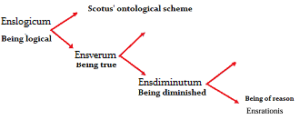
Arquivo para April 29th, 2025
Heidegger as a reader of Duns Scotus
Little is known about the origins of Heidegger’s thought under the influence of Duns Scotus. The first observation is that his master’s thesis was on Duns Scotus’s doctrine of categories and meaning (Die Kategorien und Bedeutungslehre des Duns Scotus, 1915), which alone is worth a profound influence.
influence of Duns Scotus. The first observation is that his master’s thesis was on Duns Scotus’s doctrine of categories and meaning (Die Kategorien und Bedeutungslehre des Duns Scotus, 1915), which alone is worth a profound influence.
Of course, the direct influence was that of his teacher and master (of phenomenology) Edmund Husserl, but Husserl himself would have been surprised to read his work on Being and Time, so we have to go back to the first Heidegger, who was also influenced by Kant’s idealism.
The interest in the Categories goes back to the studies of Porphyry and his translator Boethius, to whom we owe the famous “quarrel of the universals”, but Heidegger takes it up again with Frans-Brentano.
His reading of Franz Brentano’s Thesis (1862): “The multiple meanings of the entity according to Aristotle” comes from Aristotle’s classic text “The Categories”, the doctrine of signification that will be taken up by Husserl, a disciple of Franz Brentano, is thus denoted by Heidegger: “as the doctrine of signification highlights the different categorical formations starting from ‘signification in general’ and lays the foundation for all further elaboration of the logical problems of meaning and validity” (HEIDEGGER 1978, p. 203).
It’s important to note that Heidegger later clarified that his studies of the “Grammatica Speculativa” of Duns Scotus* were actually an expanded text by Thomas Efurt, Heidegger expounds the theory of modus significandie and its relation to modus intelligendie and modus essendi.
Husserl, in the light of his Logical Investigations (published in 1900/1901) and, elaborated in volume I of Ideas for a pure phenomenology and for a phenomenological philosophy (published in 1913), what Scotus called ens rationis (being of reason), Husserl calls noematic sense, and what Husserl calls Noesis is for Scotus direct intuition.
Returning to Porphyry (which we have already covered in previous posts), Scotus writes: “To the first question, it must be said that the universal is in a thing as in a subject, because it designates it, not the intellect. But the unintelligible is in the doer and the known in the knower.” (SCOTUS 1998, p. 826), in direct translation from Latin, is where he relates the objective mode to the subjective.
For Scotus, the ens rationis is not subjective in the intellect, it is not something that exists as an “affection of the soul”, it is something that is in an objective way, as something represented by the intellect, referring to a thought content, this is partly due to his being called a moderate realist.
But its grammar is well developed and cannot be separated from a linguistic root, as Heidegger explains: one thing is the linguistic form of an expression, which the medieval´s called “voices” (Heidegger, 1978, p. 290-291) another thing is the content of the pressure, its meaning and interweaving of judgments.
* Duns Scotus was a Franciscan monk, although a teacher, he lived in poverty, putting his possessions in common.
Aristóteles. (2013) Da Interpretação (Ed. Bilíngue). São Paulo: UNESP.
Heidegger, M. (1978) Frühe Schriften -Gesammtausgabe (Primeiros Escritos – Edição Completa) Vol. I. Frankfurt am Main: Vittorio Klostermann.
Husserl, E. (2006) Ideias para uma fenomenologia pura e para uma filosofia fenomenológica. Brazil, SP, Aparecida: Ideias & Letras.
Scotus, D. Opera Omnia – editio minor I: Opera Philosophica (a cura di Giovanni Lauriola). Bari: Alberobello, 1998.

